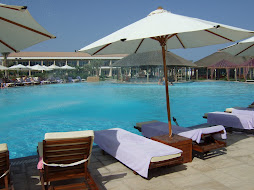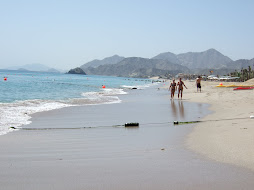
Finally something to see for our money!!!! Our apartment is located on the ninth floor.
Six months ago we posted an article citing top ten reasons to buy property in Abu Dhabi. We have decided to provide an update to let you all know how things are going. All the points we made then are still valid, but considering turbulent international financial markets, I felt a new post was required.
News Flash:
Well it's hardly news but the dollar has continued its steady trend downward against the euro. The UAE dirham is pegged to the dollar so any downturn in the dollar will affect the UAE/EUR rate. Since we began paying for our apartment in May 2006, the dirham has fallen by 33% against the euro. This means our property has cost us far less than we initially anticipated.
Obviously, were we to sell or rent out the apartment, the income or profit converted back to euro would suffer the adverse exchange rate. We are hoping to hold on to the apartment for a number of years and would expect either the dollar to begin some sort of a recovery, or failing this, the GCC ( Gulf Cooperation Council) or the UAE government may be forced to depeg from the dollar as inflation soars in the region.
Our experience so far has been in the most part positive. We purchased through First Gulf Bank and as such have some degree of additional security through the bank's reputation. However, problems still exist, and while we have received receipts and confirmation for all our payments and a purchase agreement, as yet no final contract is available. The reason we are being given is due to the new freehold law which has delayed the issue of contracts. While this would seem incredibly unusual in western property markets it's par for the course in the UAE. Again if it's high reward you are after (as we are) there will always be considerable risks associated.
The worst stories emerging from the Dubai market concern properties that have not been built, as rising construction costs make them unprofitable for the construction companies. In these situations investors were given back their money plus a modest return on investment (6%-8%), and while far from ideal this does give some degree of security on investment. The majority of people appear to have a positive experience of investing in Dubai and one would expect the same reaction from Abu Dhabi.
The demand for rental property in Abu Dhabi has increased at an alarming rate, so much so the government has had to introduce rental caps as the market struggles to cope with shortage of supply. Rental yield in 2007 exceeded 20% in some cases, and are expected to grow further in 2008.
Capital growth has steadily increased with a secondary market beginning to become more relevant.
For further information Arabian Business news has produced an excellent survey of property in the area.



